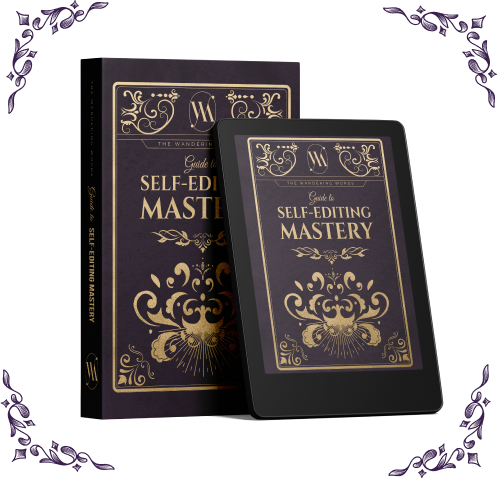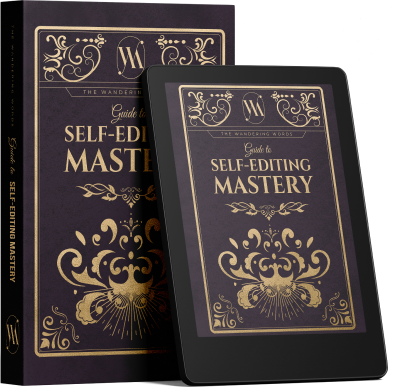Our Guide to Self-Editing Mastery has helped thousands of authors just like you:
- Pre-edit their books with ease
- Avoid the most common writing errors
- Quickly identify spelling & grammar mistakes
- Be more prepared for professional editing
Our Guide to Self-Editing Mastery has helped thousands of authors just like you:


"Cite your sources!" your editor cried.
"This needs a citation, too."
"Where did you get this info?"
"Where did these numbers come from?"
"Cite! Cite! Cite!"
Oh, dear. Looks like we need to cite our sources...but how?!
Never fear - Wandering Words Media is here to walk you through the citation process!
Here's why:
The following:
Generally, if you are quoting something--directly or indirectly--you need to tell people where the information came from. Some famous quotes can get away without a citation, or with an informal citation--for instance, "Ask not what your country can do for you, but what you can do for your country" could go on its own, or with a little "-John F. Kennedy" afterward. You also have some protection under Fair Use law (in the U.S., at least), when it comes to parody and reviews, so if you jokingly quote a movie or even adjust the quote a little bit ("Ask not what your donut shop can do for you, but what you can do for your donut shop") you don't necessarily have to break out a citation.
But again, especially when it comes to direct quotations or taking information from another source, it's usually best to be safe rather than sorry.
Okay, so we need to cite our work. We know what work we need to cite.
Well, there are lots of methods. Our favorite is Chicago Manual of Style citations, since they are industry standard. However, you may be familiar with APA or MLA citations.
Whichever method you choose, simply listing the book or URL in the text or footnote is NOT ENOUGH. You have to properly cite your sources if you want to avoid getting sued, and that can get a little complicated.
Luckily, we have some sources (haha) that will help you with that. It's far too complex for one blog post, but these websites will be a great help:
Oh, song lyrics. Look, I'm not sure why, but for some reason song lyrics are the WORST to cite. You typically have to reach out to whomever owns the song (like, Madonna herself, or whatever record label technically owns Madonna's music) in order to quote the song lyrics, and usually this results in paying a (sizable) fee.
Some people risk it and just leave the song lyrics in anyway. We really don't suggest doing this, because if you do, and you are caught, you could be sued. In this case, by Madonna. There are much less expensive ways to get an autograph, my friend.
My advice: don't include song lyrics. Song titles are fine--just go with that, and leave the lyrics alone.
Here's more info on quoting song lyrics: https://blog.bookbaby.com/how-to-write/writing-tips/lyrics-in-books
You need to cite your work so you are not stealing and profiting off of other people's work. Stealing other people's work is immoral. And illegal. It can ruin your credibility if people see that you are stealing other people's work, and it can get you sued.
Well...no, I don't recommend that. Remember the list earlier? Citations give your book credibility, as well as making your work convincing and legally sound. Look at these two options:
The second option has a solid fact from a solid source. We can check out that source on our own to read more, if we like. See that little 3 at the end? That's a superscript. In the footnote will be a citation, which will tell us where we can find Dr. Sophia Hawk's paper.
You might have heard about the importance of credible sources. Let's put it this way:
Who are you more likely to believe? The answer (hopefully) is number two, the cited source (not Aunt Susan) that is from a credible organization (the Fish and Wildlife Association.
Is Big Fish Boys Blog a good source? Maybe. But you'd have to do some research AND prove it to your reader with something like this:
"John Howards, 5-time National Trout Fishing gold medalist and a fisher of Lake Superior for over three decades, claims there are far fewer fish in Lake Superior this year on his blog, Big Fish Boys Blog.⁵"
That, my friends, follows the Introduce, Cite, Explain (ICE) method of citation.
Introduce - Introduce your source to the reader. Their name, yes, but also their credentials. It's not just "John Howards" or even "Fisherman John Howards," but ""John Howards, 5-time National Trout Fishing gold medalist and a fisher of Lake Superior for over three decades." Tell us, briefly, why we should trust this person on this matter.
Cite - Give us that citation, both in the text ("on his blog, Big Fish Boys Blog") and in the footnote and/or bibliography, references page, etc.
Explain - This part wasn't shown in the example above, but after you've told us who the source is and cited what the source said, you now have to explain why this quote is important. Okay, so there are less fish. So what? What does this have to do with the rest of your book/piece of writing? Don't rely on the reader to connect the dots--help them out. If your book was actually about frog overpopulation, you might Explain like this:
"John Howards, 5-time National Trout Fishing gold medalist and a fisher of Lake Superior for over three decades, claims there are far fewer fish in Lake Superior this year on his blog, Big Fish Boys Blog.⁵ Since there are fewer fish, and a big source of food for these fish are tadpoles and frog eggs, it is likely that the fewer fish have been a factor in the overpopulation of frogs."
But wait! Why didn't you have to cite that tadpoles and frog eggs are a source of food for fish, or that it's likely that the two facts are connected?
You don't have to cite common facts. Otherwise, you'd be here all day, citing that 1 + 1 = 2. That info wasn't from any source--it came from the author's brain, helped along by the info their sources offered. You don't have to cite anything you make up, or anything you know off the top of your head...but if you start quoting stats, even stats that you know off the top of your head, you will have to figure out where those stats come from. Because they might not even be true in the first place.
In other words, let's say you learned that an elephant is an herbivore in a book in elementary school. You don't have to dig up that second-grade science textbook to cite where you learned this information. However, let's say you remember hearing that 1200 elephants live in Kenya. Well, that's pretty specific. Where did you learn that fact? Is it even true? For this, I'd suggest you find a source to back you up, and then cite that source.
Okay! So hopefully now, you know:
Yes, this part of writing can be tedious, but it is WORTH IT.
Happy citing!
~Christina

